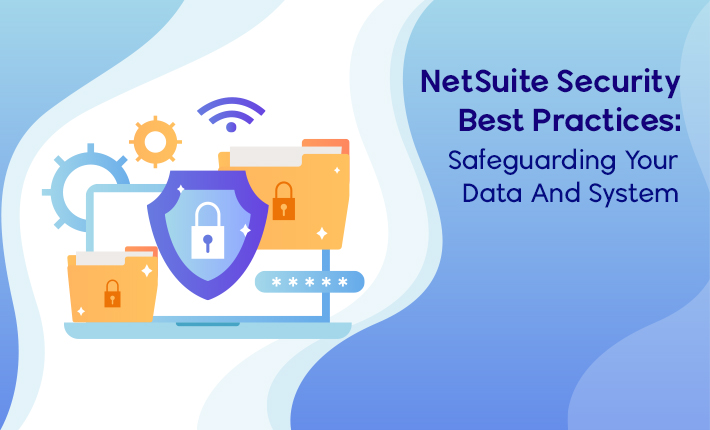NetSuite, a robust cloud-based ERP platform, offers a wide range of functionalities to help businesses manage their operations effectively. However, ensuring the security of your data and system is paramount to protect sensitive information and maintain the trust of customers and stakeholders. In this article, we will explore essential NetSuite security best practices that can help safeguard your data, prevent unauthorized access, and mitigate potential security risks.
1. Implement Strong User Access Controls
Controlling user access is crucial in maintaining the security of your NetSuite system. Follow these best practices:
a. Role-based Access: Assign user roles with specific permissions based on their job functions, granting access only to the necessary features and data.
b. Two-Factor Authentication (2FA): Enable 2FA to add an extra layer of security. Users will need to provide a second verification factor, such as a unique code sent to their mobile device, in addition to their password.
c. Password Policies: Enforce strong password policies, including requirements for complexity, regular password updates, and prohibiting password reuse.
2. Regularly Monitor and Audit User Activities
Keeping track of user activities within NetSuite helps detect and prevent unauthorized actions. Consider the following practices:
a. Audit Trails: Enable the audit trail feature to log user activities, such as login attempts, data modifications, and system configuration changes. Regularly review these logs to identify any suspicious behavior.
b. IP Address Restrictions: Restrict access to NetSuite by whitelisting trusted IP addresses, limiting access to authorized locations.
c. Suspicious Activity Alerts Configure alerts to notify administrators of any unusual or suspicious activities, such as multiple failed login attempts or data export outside regular working hours.
3. Encrypt Sensitive Data
Encrypting sensitive data adds an extra layer of protection, even if unauthorized users gain access to the system. Consider these practices:
a. Data Encryption at Rest: Enable NetSuite's built-in encryption capabilities to encrypt data stored in the system's databases, safeguarding it from unauthorized access.
b. Secure File Attachments: Encrypt sensitive files before attaching them to NetSuite records, ensuring their confidentiality even if accessed outside the system.
4. Regularly Update and Patch NetSuite
Keeping your NetSuite instance up to date with the latest patches and updates is crucial for addressing security vulnerabilities. Follow these practices:
a. Enable Automatic Updates: Configure NetSuite to automatically apply updates and patches as they become available, reducing the risk of security gaps.
b. Stay Informed: Stay updated with NetSuite's release notes and security advisories to understand potential vulnerabilities and apply necessary fixes promptly.
5. Educate and Train Users
User awareness and training play a vital role in maintaining a secure NetSuite environment. Implement the following practices:
a. Security Awareness Programs: Conduct regular security awareness programs to educate users about common threats, phishing scams, and best practices for secure usage.
b. Ongoing Training: Provide training sessions and resources to familiarize users with NetSuite's security features, password management, and data handling best practices.
6. Regularly Backup Your NetSuite Data
Regular data backups are essential for disaster recovery and protecting against data loss or system failures. Consider these practices:
a. Scheduled Backups: Set up regular, automated backups of your NetSuite data to ensure you have recent copies available for restoration if needed.
b. Test Data Restoration: Periodically test the restoration process to validate the backup integrity and ensure it is functioning correctly.
7. Use Secure Network Connections
Ensure that all network connections to NetSuite are secure to prevent unauthorized access and data interception. Consider the following practices:
a. Secure Socket Layer (SSL) Certificates: Enable SSL certificates to encrypt data transmitted between users' browsers and the NetSuite servers, protecting it from interception.
b. Virtual Private Networks (VPNs): Encourage remote users to connect to NetSuite through secure VPNs, which create an encrypted tunnel for data transmission, ensuring secure access.
c. Secure File Transfer Protocol (SFTP): When transferring files to and from NetSuite, use SFTP instead of regular FTP to encrypt data during transit.
8. Limit System Customizations
Excessive system customizations can introduce security risks and complicate future updates. Follow these best practices:
a. Use Standard NetSuite Functionality: Leverage the robust functionality provided by NetSuite without excessive customization, as it may introduce vulnerabilities.
b. Evaluate Third-Party Integrations: Vet third-party integrations for security compliance and perform thorough testing before implementing them to ensure they do not compromise system security.
c. Regularly Review Customizations: Periodically review existing customizations to ensure they remain secure and aligned with changing business needs.
9. Conduct Regular Security Assessments
Performing regular security assessments helps identify vulnerabilities and areas for improvement. Consider the following practices:
a. Penetration Testing: Engage professional ethical hackers to conduct penetration testing and identify potential security weaknesses.
b. Vulnerability Scanning: Utilize vulnerability scanning tools to identify known security vulnerabilities within your NetSuite environment.
c. Security Audits: Conduct periodic internal security audits to assess compliance with security policies and identify areas for improvement.
10. Establish Incident Response Procedures
Having a well-defined incident response plan helps minimize the impact of security incidents. Consider the following practices:
a. Incident Identification and Reporting: Establish processes for promptly identifying and reporting security incidents to the appropriate stakeholders.
b. Containment and Recovery: Define steps to contain the incident, mitigate further damage, and restore the affected systems and data.
c. Post-Incident Analysis: Conduct a post-incident analysis to identify the root cause, lessons learned, and recommendations for future prevention.
Conclusion:
Protecting your data and system integrity is of utmost importance when using NetSuite Services. By implementing robust security practices such as strong user access controls, monitoring user activities, encrypting sensitive data, staying updated with patches, providing user education, performing regular data backups, using secure network connections, limiting system customizations, conducting security assessments, and establishing incident response procedures, businesses can minimize the risk of data breaches, unauthorized access, and other security threats. Prioritizing NetSuite security best practices ensures the confidentiality, integrity, and availability of your data, ultimately building trust with customers and stakeholders.















Post Comments